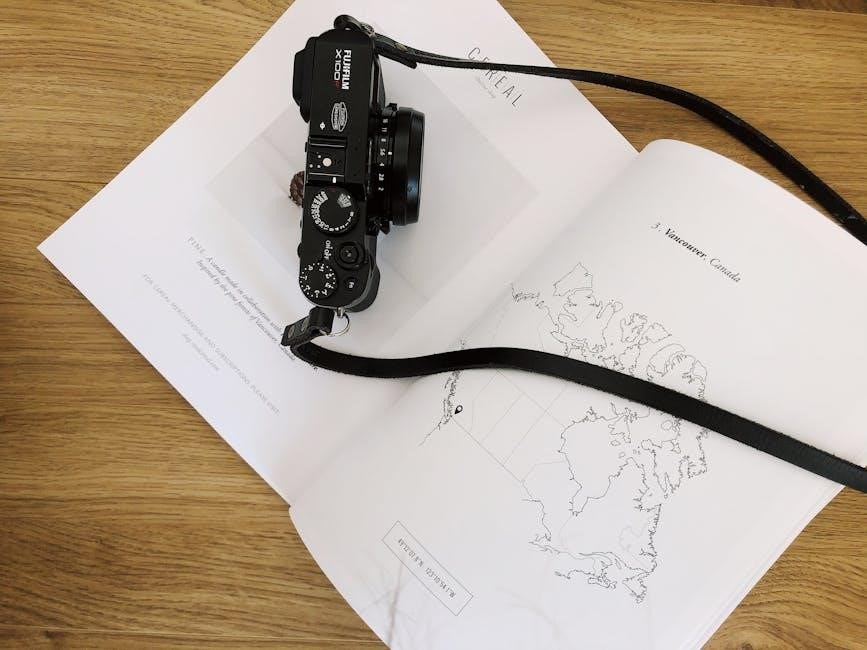Act III Romeo and Juliet Study Guide Overview
Act III of Romeo and Juliet is a pivotal point‚ marking a shift from romantic bliss to tragic conflict. This section explores key themes‚ plot twists‚ and character development‚ providing a detailed analysis of the play’s progression. The study guide offers insights into the consequences of impulsive decisions and the escalating feud between the Montagues and Capulets.
Act III of Romeo and Juliet marks a dramatic turning point‚ shifting the tone from romantic bliss to tragic conflict. This act introduces pivotal events‚ including the deadly confrontation between Mercutio and Tybalt‚ Romeo’s subsequent banishment‚ and Juliet’s defiance of her parents. The study guide provides a detailed analysis of these scenes‚ exploring the characters’ motivations and the escalating tensions that drive the play toward its tragic conclusion. This section sets the stage for the heartbreaking events that unfold.
1.2 Key Themes in Act III
Act III explores themes of impulse and consequences‚ as characters act rashly‚ leading to tragic outcomes. The clash between love and hate intensifies‚ highlighting the destructive nature of the feud. Fate vs. free will emerges‚ as characters’ choices sealed their destinies. Loyalty and betrayal are tested‚ particularly in Mercutio’s death and Juliet’s defiance. These themes deepen the emotional tension and foreshadow the inevitable tragedy‚ making Act III a pivotal moment in the play.
1.3 Major Plot Points in Act III
Act III unfolds with Mercutio’s death at Tybalt’s hand‚ prompting Romeo to avenge his friend by killing Tybalt‚ leading to his banishment. Juliet learns of Romeo’s exile‚ sparking her defiance against her parents’ plan to marry Paris. The Friar devises a plan to save Juliet by feigning death‚ while Romeo‚ unaware of this plan‚ resolves to end his life. These events escalate the tragic momentum‚ driving the story toward its devastating conclusion.

Scene 1: A Public Place
In Scene 1‚ Benvolio’s concern about the heat sparks tension. Tybalt confronts Romeo‚ who declines to fight‚ leading Mercutio to step in‚ resulting in tragic consequences.
2.1 Benvolio’s Warning About the Heat
Benvolio warns that the hot weather could provoke tempers‚ leading to conflict. He suggests avoiding confrontation‚ fearing the heat might escalate tensions. His caution reflects awareness of the volatile rivalry between the Montagues and Capulets‚ highlighting the theme of fate and impending tragedy. Despite his efforts to prevent violence‚ his warnings go unheeded‚ setting the stage for the tragic events that follow.
2.2 The Fight Between Mercutio and Tybalt
Mercutio and Tybalt engage in a fierce duel‚ fueled by pride and animosity. Mercutio’s witty remarks mask his aggression‚ while Tybalt’s hatred for the Montagues drives his actions. Despite Romeo’s attempts to intervene‚ the fight escalates‚ resulting in Mercutio’s fatal injury. This pivotal moment highlights the destructive nature of their feud and sets off a chain of tragic events‚ deeply impacting Romeo and the overall narrative.
2.3 Romeo’s Attempt to Stop the Fight
Romeo attempts to stop the fight between Mercutio and Tybalt‚ intervening to prevent further violence. He steps in‚ pleading with them to calm down‚ as he believes fighting will lead to dire consequences. Romeo’s efforts‚ however‚ are unsuccessful‚ and Tybalt fatally stabs Mercutio. This tragic event unfolds despite Romeo’s good intentions‚ showcasing the unavoidable nature of the conflict and the devastating outcome of their rivalry.
2.4 Mercutio’s Death and Its Consequences
Mercutio’s death at Tybalt’s hand is a tragic turning point in Act III. Stabbed under Romeo’s arm‚ Mercutio’s fatal wound sparks Romeo’s rage and grief. Overcome with emotion‚ Romeo confronts Tybalt‚ leading to Tybalt’s death. This act of revenge results in Romeo’s banishment from Verona‚ escalating the families’ feud and sealing the lovers’ fate. Mercutio’s death underscores the senseless violence and irreversible consequences of their rivalry‚ forever altering the play’s trajectory.

Scene 2: Capulet’s Garden
In Capulet’s garden‚ Juliet expresses anxiety about Romeo’s absence. The Nurse arrives with news of Romeo’s banishment‚ intensifying Juliet’s emotional turmoil and determination to act.
3.1 Juliet’s Soliloquy and Impatience
Juliet‚ in her soliloquy‚ reveals deep impatience and longing for Romeo‚ expressing her frustration at the slow passage of time. Her emotional state highlights her love’s intensity and vulnerability‚ showcasing her maturity as she awaits news of her husband. Her words convey a desperate desire for resolution‚ foreshadowing the drastic decisions she will make to preserve her love amidst the growing conflict.
3.2 The Nurse’s Arrival with News
The Nurse arrives at Juliet’s chamber‚ tearfully delivering news of the fight between Romeo and Tybalt. She prolongs Juliet’s suspense‚ recounting the events dramatically. Juliet‚ anxious and distraught‚ pleads for clarity. The Nurse finally reveals Romeo’s banishment‚ deepening Juliet’s despair. Her loyalty to Juliet is evident‚ yet her emotional storytelling heightens the tension‚ showcasing Juliet’s vulnerability and the tragic consequences of the conflict.
3.3 Juliet’s Reaction to Romeo’s Banishment
Juliet is devastated by the news of Romeo’s banishment‚ feeling abandoned and desperate. She collapses into a state of emotional turmoil‚ expressing her despair and helplessness. Juliet defies her parents’ wishes‚ refusing to marry another man‚ and turns to the Nurse for support. Her reaction highlights her deep love for Romeo and her willingness to risk everything to be with him. This moment underscores Juliet’s resilience and determination in the face of tragic circumstances.

Scene 3: Friar Laurence’s Cell
Romeo‚ overwhelmed by grief and anger‚ seeks Friar Laurence’s help after learning of his banishment. The friar devises a plan to reunite Romeo with Juliet‚ offering hope amidst despair.
4.1 Romeo’s Despair and Decision to Kill Himself
Romeo‚ overwhelmed by grief and anger‚ visits Friar Laurence after learning of his banishment. Believing his life is meaningless without Juliet‚ he decides to end his life‚ revealing his impulsive nature. His despair highlights the depth of his love and the devastating impact of the feud. This moment underscores Romeo’s emotional volatility and sets the stage for tragic consequences‚ showcasing his inability to cope with separation from Juliet.
4.2 Friar Laurence’s Plan to Save Romeo
Friar Laurence devises a plan to reunite Romeo with Juliet by giving her a potion to feign death‚ allowing her to escape marriage to Paris. He intends for Romeo to rescue her from the tomb‚ but the plan relies on precise timing and communication. This scheme‚ though well-meaning‚ carries significant risks and ultimately contributes to the tragic outcome. The Friar’s intervention highlights themes of hope‚ desperation‚ and the unpredictable nature of fate in the play.

Scene 4: The Capulet Household
Tension rises as Juliet defies her parents‚ refusing to marry Paris‚ leading to Lord and Lady Capulet’s shocked and angered reaction‚ escalating the family conflict.
5.1 Juliet’s Defiance of Her Parents
Juliet boldly defies her parents by refusing to marry Paris‚ showing unwavering loyalty to Romeo. Her parents‚ shocked and angered‚ insist on the marriage‚ threatening to disown her. Juliet’s courage highlights her determination to follow her heart‚ despite the consequences. This act of defiance escalates the family conflict and showcases Juliet’s transformation from a obedient daughter to a strong-willed individual‚ willing to risk everything for love.
5.2 Lord and Lady Capulet’s Reaction
Lord and Lady Capulet are furious upon Juliet’s refusal to marry Paris. Lord Capulet‚ initially calm‚ becomes enraged‚ threatening to disown Juliet if she disobeys. Lady Capulet‚ equally angered‚ refuses to show motherly compassion‚ siding with her husband. Their harsh reactions reveal their rigid adherence to societal expectations and familial honor‚ leaving Juliet isolated and desperate. This confrontation intensifies the familial conflict‚ highlighting the parents’ inability to understand Juliet’s heartfelt plea for autonomy and love.

Scene 5: A Public Place Again
Scene 5 revisits the public place‚ escalating tensions as Romeo confronts Tybalt. The tragic fight results in Tybalt’s death‚ leading to Romeo’s banishment and intensifying grief and chaos.
6.1 The Tragic Confrontation and Tybalt’s Death
The confrontation between Romeo and Tybalt in the public place is intense and tragic. Tybalt provokes Romeo‚ who initially refuses to fight‚ but after Mercutio’s death‚ Romeo’s anger overcomes him. In a fierce duel‚ Romeo kills Tybalt‚ leading to his banishment from Verona. This pivotal moment marks a turning point in the play‚ escalating the feud and sealing the lovers’ fate with irreversible consequences.
6.2 Romeo’s Banishment and Its Impact
Romeo’s banishment from Verona‚ decreed by Prince Escalus‚ follows his slaying of Tybalt. This punishment separates him from Juliet‚ intensifying their emotional turmoil. Juliet’s parents‚ unaware of her secret marriage‚ arrange her wedding to Paris‚ deepening her despair. Romeo’s absence forces Juliet to seek drastic solutions‚ while his banishment accelerates the tragic sequence of events‚ ultimately leading to the play’s devastating conclusion. The banishment underscores the destructive nature of the feud and the lovers’ helpless fate;
Study Guide Questions and Analysis
This section provides in-depth questions and analysis for Act III‚ focusing on key themes‚ character motivations‚ and tragic outcomes. It aids in understanding the play’s emotional depth and preparing for exams with tailored study materials.
7.1 Key Questions About Act III
- Why does Romeo refuse to fight Tybalt‚ and what are the consequences of his decision?
- How does Mercutio’s death impact Romeo and the overall plot?
- What motivates Juliet to defy her parents‚ and how does this reflect her character development?
- How does Friar Laurence’s plan aim to resolve the conflict‚ and what risks does it entail?
- What role does the heat play in Benvolio’s warning‚ and how does it foreshadow events?
- How does Romeo’s banishment affect both families and the lovers’ relationship?
- What does Juliet’s reaction to the news of Romeo’s banishment reveal about her emotional state?
7.2 Character Analysis in Act III
- Romeo transitions from a peaceful lover to a vengeful husband‚ driven by rage after Mercutio’s death.
- Juliet shows defiance and maturity‚ refusing to marry Paris and prioritizing her love for Romeo.
- Tybalt’s aggressive nature escalates the conflict‚ revealing his deep hatred for the Montagues.
- Mercutio’s fiery personality and loyalty to Romeo lead to tragic consequences.
- Friar Laurence attempts to mediate‚ showcasing his wisdom but also the risks of his plans.
- The Nurse’s loyalty wavers‚ highlighting her emotional conflict and ultimate betrayal of Juliet’s trust.
7.3 Themes and Symbolism in Act III
In Act III‚ themes of fate‚ impulsive behavior‚ and conflicting loyalties dominate. The feud escalates‚ symbolizing irreconcilable hatred. Love turns tragic as Romeo’s impulsive actions seal his fate. Light and dark imagery contrasts hope with impending doom. The apothecary’s poison represents desperation and ultimate sacrifice‚ while the fight scenes symbolize chaos and destruction. These elements weave together to highlight the inevitability of tragedy in Verona.



